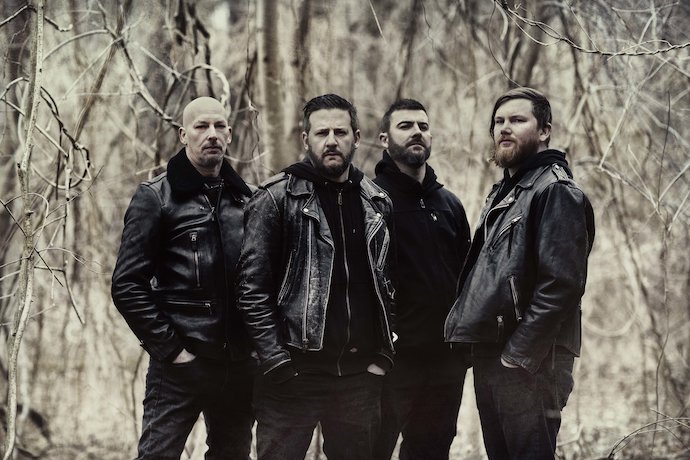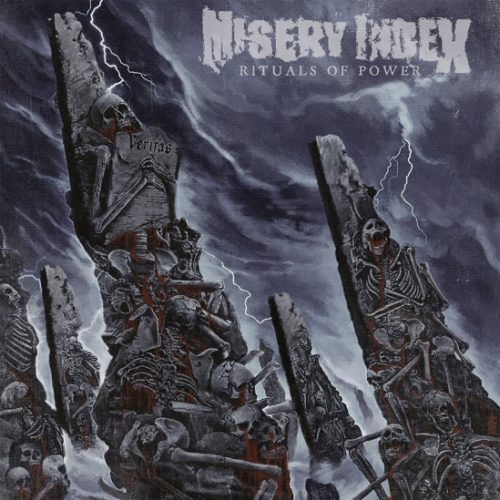(In this week’s edition of Waxing Lyrical, Andy Synn posed his usual questions about lyrics to Jason Netherton of Misery Index, whose new album Rituals of Power will be released on March 8 by Season of Mist.)
Is it selfish of me to admit that, as much as I hope everyone is enjoying the series so far, one of the primary reasons for coming up with the concept of “Waxing Lyrical” was so that I’d get the chance to speak to, and learn more about, some of my favourite vocalists/lyricists?
Well, selfish or not, it’s the truth, and today’s edition is a particularly special one, as it features one half of one of my favourite vocal tag-teams, Jason Netherton of the mighty Misery Index.
BEGINNINGS…
Since the late 1980s, I have been in three ‘primary’ bands, and in each, the lyrics have always been kind of like my department, or specialty, as I suppose I was always the one who was into words and prose enough to take on the task.
I grew up reading a lot of poetry, and a lot of the classics, from Poe, Coleridge, Milton and so on, and really appreciated the work and wit which went into constructing imagery and even entire worlds from simple word combinations, and the power and durability that words can carry, especially when placed in rhyme and verse.
So I took on the lyric writing duties for Misery Index pretty much entirely on my own at first, up until about 2006, when Mark (Kloeppel) joined the band.
I thought it would be good to inject a different voice into some of the songs, not just from a lyrical perspective, but also from a vocal-pattern perspective, which is really what makes the words ultimately fit onto/into the music.
And while I still write the majority (about 85%) of the lyrics, Mark also contributes and does a lot to prepare the vocal patterns to be ready for the actual lyrics.
INSPIRATIONS…
As far as general inspiration, aside from the aforementioned poetry, the love of words was really driven home by certain books I came across over the years.
Some all-time favourites include Clive Barker’s Weaveworld, Jack London’s Martin Edenand The Sea Wolf, Isaac Asimov’s Foundation trilogy, Tolstoy’s The Death of Ivan Ilyich, Cormac McCarthy’s The Road, Orwell’s 1984, Hemingway’s For Whom the Bell Tolls, Dickens’ Hard Times, Steinbeck’s Cannery Row… and numerous others.
As for non-fiction, there was Nietzsche, Marx, and Foucault, and more recently the writings of Nicholas Carr on media and technology.
In terms of other lyricists, there are several; some of the bigger “non metal” ones are pretty much anything from Nick Cave, as well as Bob Dylan, mostly for Desire (in conjunction with Jacques Levy) (1976) and Blood on the Tracks (1975) as well as Jarvis Cocker for his lyrics in Pulp.
And, of course, in Metal, some real classics like the work of Geoff Tate for Queensryche’s Operation Mindcrime (1988), Keith Deen for Holy Terror’s Mind Wars (1988) and John Arch for Fates Warning’s Awaken the Guardian (1986) (this is a real high school classic, and really took me away to other times and places).
More recently, I like what Alan Averill from Primordial has been writing, as well as Mat McNerney from Hexvessel/Grave Pleasures.
However, my all-time favorite is Martin Walkyier from Sabbat, for History of a Time to Come (1988) and Dreamweaver (1989), as well as for all of his work in Skyclad. To me, Martin is a genius, a phenomenal wordsmith of the English language in the classic tradition, and just incredibly underrated.
INFLUENCES…
Here are two older examples, and one new (from the above-mentioned):
In its wake the immoral wasteland
Fallout erodes the technological shrines to greed
Damnation of the most sacred mother
Three piece jackal prophecy decreed
The fusion heavens, the burning rainfall
Allied breaks in the pattern of all that is
Righteous faction, bribe a blessing
Respite fallacy by blinded ghouls
Now with hindsight I admit I don’t admire the humans’ lot
Frail bodies, fragile, ill-equipped, their lives are hard but they are not
Planet Earth is great to visit
It’s great to visit but you wouldn’t want to live there
And when you know the ways of men
Then you can only pity them
Every day a raging storm
Castaway in a carbon-based life form
Oh Luther, did you know you were able
To pierce the tongues of liars?
A gospel of ruin from the heretic’s age
Straight from the mouth of fire
A lone martyr on the hill of perdition
Broken flesh that many traitors confess
A document in the blood of sedition
Blasphemy led from the printer’s press
CHANGES…
When I started out in the late ’80s, the lyrics were kind of this idealistic, Power Metal-y stuff. All very Iron Maiden, very high school, always about some humanistic theme.
Then in the early ’90s it was the Death Metal shock and gore stuff, which in hindsight was more about the vocal patterns than any substance in the lyrics.
That kind of changed in the late ’90s when I wanted to started screaming more ‘real world’ type stuff that had more underlying meaning and direction. I started listening to more Grind and Punk then, where I felt the lyrics just had more authentic, visceral anger to them – stuff like His Hero is Gone and Tragedy, Nasum, Assuck, even the witty satire stuff of Dead Kennedys and The Clash was creeping in (who I totally missed in the ’80s).
So my last album with Dying Fetus (Destroy the Opposition) was probably the most mature representation of that era.
From the 2000s on, Misery Index was very much lyrically-rooted in the Grind/Punk realm, ruminating on themes like power, social ills, corruption, etc. This was the primary approach up until about 2014, when we made The Killing Gods. On this album, I talked to Mark and we decided to go more metaphorical/allegorical, and although the lyrics still dealt with real world issues, the idea was to be (if possible) more poetic and slightly abstract with the lyrics. To let people interpret them rather than just simply make them concretely, discernibly about something.
The best example of this was our decision to use the classic Faustian tale as a vehicle for questioning the rationality of capitalist ‘creative destruction’ (as a guiding, teleological force), given the slow death of the planet and its global effect on humanity.
The new album, Rituals of Power, carries this slightly more abstract approach forward. It’s about the concept of “truth” and examines the ways that truth itself has become this thing which is open to debate and question, especially when funneled through our modern media systems (social media, echo chambers, fake news, etc.).
To me, this is the biggest single threat to democracy and civilization itself. If we can’t agree on the basic terms and conditions of what and how we debate in society, then we can’t even begin to have a discussion and change anything for the better.
Something needs to happen, because things are getting ugly.
SOMETHING OLD…
“The Carrion Call” remains a staple in our set. It kind of explores the idea of “what will the world be like AFTER people”, which they made a few TV shows about back then. These kind of TV programs served, on one hand, as a kind of cautionary tale, of “what could happen” as we go down this path of unending consumption and growth.
However, from another perspective, they could also be interpreted as these kind of fatalistic visions of an inevitable future that were mentally preparing us for the fact that we are destroying the world, and yet… the earth is this resilient, living thing that will regenerate, and once the human cockroaches are gone it’s all back to normal, a natural rebirth.
Call of the carrion crow
Civilized man had no friend
Whale of the silent sea
The ocean is yours, they’ve left it empty
Hawk and the emerald dove
Soar and sail on wings above
Across halcyon streams
To a place where madmen once would dream…
So, I took that theme and worked it into a kind of epitaph for a post-human world, and – drawing influence from Martin Walkyier – employing the play on words with the expression “A Clarion Call” being altered to “The Carrion Call”, making decay, and rebirth from decay, the prevailing theme of the song.
Also the “whale of the silent sea” line is inspired by Skyclad’s “Silent Whales of the Lunar Sea.”
Moreover, there are also other little subtleties, even in this one verse, as “halcyon” means both a past, more idyllic and happier time, as well as the genus of birds known as the kingfisher family.
SOMETHING NEW…
The title track of the new album, “Rituals of Power” is a song which dwells lyrically on the interrelation of truth with power from a historical perspective. Regimes of power have always been built and rationalized upon their own logics of truth, which most always serve to justify the existing order of things.
I think this song lyrically is a good representation of the use of metaphor and imagery, and the way that Mark wrote the song also opened it up for a lot of space for using lyrics and vocal patterns in ways we have not before.
In particular there is an extended middle section which is more mid-paced, melody-tinged, and melancholic, where the lyrics could also really breathe and open up. So I wrote the following passage:
No-one cares who lives or dies, no empathy, no compromise
The crows descend, the children mourn, the ichor spills and the crosses burn
Like Visigoths at the gates of Rome, a great decline into a great unknown
Marble eyes, obelisks, cenotaphs, Bolsheviks
Cities burn and ashes rain, no one speaks of us again
Each and all, swept away… like grains of sand on the shore of time
For this, I really wanted to come up with a series of lines that carried well with the somber tone of the multi-layered guitars, and since the song has this kind of historical, generational perspective on the concepts of power and truth, I wanted to tie in our current nihilistic ‘post-truth’ era with the rise and fall of previous power regimes and civilizational orders.
Again, its another cautionary tale of sorts (and one which also conjures the image of the crow, which symbolically represents tragedy), but I also hope it’s one which remains in the realm of fiction.
AND FINALLY…
Thanks for the invitation to talk, it was a pleasure.



Shouldn’t it be Waxing lyrically!?
Awesome. I’ve always liked Misery Index because of 2 aspects: their music and sound, and their lyrics and the issues they confront in the lyrics. Few metal bands address the political subjects that Misery index does. Really looking forward to hearing their latest album.
PS–How did I miss Holy Terror in my younger days? That song was awesome. It had a hardcore punk vibe (like Dag Nasty) mixed with the metal. It was the late 80s so that makes sense.